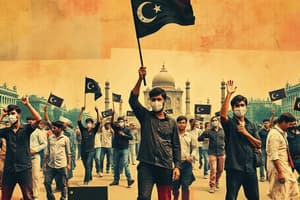Podcast
Questions and Answers
What is a goal of youth activism as discussed in the context?
What is a goal of youth activism as discussed in the context?
Why are Uganda, Bangladesh, and Austria selected for the study of youth activism?
Why are Uganda, Bangladesh, and Austria selected for the study of youth activism?
Which methodological problem is highlighted regarding field research on youth climate activism?
Which methodological problem is highlighted regarding field research on youth climate activism?
What aspect of youth activism is noted to be gendered?
What aspect of youth activism is noted to be gendered?
Signup and view all the answers
What is a significant outcome of analyzing youth activism through a global lens?
What is a significant outcome of analyzing youth activism through a global lens?
Signup and view all the answers
Flashcards
Fridays for Future (FFF)
Fridays for Future (FFF)
A global youth movement calling for urgent climate action.
New Scientific Perspectives
New Scientific Perspectives
The research on youth climate activism needs to account for diverse perspectives and methods to accurately represent global participation.
Many Forms of Activism
Many Forms of Activism
Activism can take many forms, from protests and petitions to education and community organizing.
Considering Positionality
Considering Positionality
Signup and view all the flashcards
Global Lens
Global Lens
Signup and view all the flashcards
Study Notes
Youth Activism and Fridays for Future
- Fridays for Future (FFF) is a significant civil society actor since Occupy (2018)
- New scientific perspectives are needed to analyze FFF because:
- Motivations of young people and their understanding of activism are not sufficiently investigated.
- Youth is often conceptualized as an age group, but diversity in motivation needs more consideration.
- Much FFF research is concentrated in Europe, while other contexts and their influence are not fully explored.
Aims of the Study
- Intersectional lens combining youth and social movements
- Understanding youth activism in Austria, Bangladesh, and Uganda, focusing on context-specific meanings of youth and politics.
- Examining similarities and differences in activism across the contexts, addressing gender, class, and social inequalities.
Why These Countries?
- Bangladesh and Uganda are among the most climate-vulnerable countries globally; youth is a significant population group.
- These countries have experienced organised climate activism (Bangladesh since the 1990s), but in different political contexts.
- Austria has a long history of climate activism.
- The comparison is not about North vs South, but due to inherent diversity in Southern contexts.
- The study focuses on case studies of FFF during protests rather than broader research methods.
Influence of Political Contexts
- Uganda:
- Autocratic political regime limits demonstrations.
- Climate youth movements experience limitations due to the political context.
- Bangladesh:
- Protests and major political changes impact activism.
- Austria:
- Long history of climate activism, allowing for detailed comparison.
Methodological Challenges
- Sampling: Different organizational structures of climate movements and considering fieldwork balance between urban and rural activists poses methodology challenges.
- Composition: Research must address gender, varying ages to include under-represented educational backgrounds and different approaches, such as city vs. rural activism.
- Forms of Activism: This includes organizing classes, workshops, seminars on climate crisis, engagement with stakeholders (government, NGOs, etc.), online activism, and campaigning events and providing aid.
Considering Positionality
- In research, considering researcher positionality is crucial recognizing insider/outsider perspectives, researcher status, language barriers, and reflective distance, accounting for age differences amongst the research team.
Conclusion
- Expanding globality by overcoming westernized research bias in theory, method and analysis.
- Acknowledging differences and similarities, the need for specific methods based on contexts.
- A comparative case study approach addressing the influence of global context is needed.
Studying That Suits You
Use AI to generate personalized quizzes and flashcards to suit your learning preferences.
Related Documents
Description
This quiz explores the role of youth activism through the lens of the Fridays for Future movement, focusing on Austria, Bangladesh, and Uganda. It aims to understand the diverse motivations and contexts of youth activism while addressing issues of gender, class, and social inequalities. Engage with the study's findings and enhance your knowledge of global youth movements.




